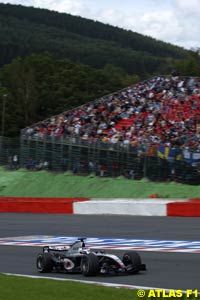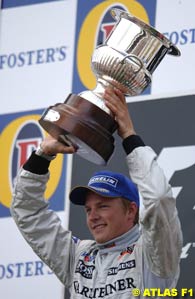
Atlas F1 Magazine Writer
After seven consecutive victories, Michael Schumacher's winning streak came to an end at the Belgium Grand Prix, where Kimi Raikkonen and his McLaren team put on a flawless performance to beat the Ferrari driver in one of the most action-packed races of the season. Atlas F1's Richards Barnes reviews the weekend's events
For once, though, the weekend wasn't all about Schumacher and Ferrari. The German's delight at winning yet another Championship must have been tinged with the disappointment that, for the first time this year, he'd been beaten fair and square out on the track. And the breaking of the drought brought with it the most thrilling, unpredictable, seesaw racing of the season.
It was almost inevitable that it would be either a McLaren or a Williams to break Schumacher's current winning streak. No matter how uncompetitive and disheartened the two British giants may seem at any stage, they have the experience, the resources and the pedigree of winning to change matters quickly. When McLaren chief Ron Dennis claimed, earlier in the year, that his team would win at least once this season, the prediction was met with smirking incredulity by many observers. At that stage, McLaren seemed incapable of even getting both cars to the finish, let alone challenging for the victory.
Yet, in modern F1, the margins between dominance and mediocrity are so small that McLaren's re-emergence shouldn't come as a surprise to anyone. It's a performance gap that they have bridged successfully many times over the past three decades, and their rapid progress with the MP4-19B merely represents more of the same. While the victory will have pleased the entire McLaren outfit, it's not new territory for them.
By contrast, Kimi Raikkonen will justifiably feel that Sunday's win represented a career milestone for him. The Finn's dogged challenge for the 2003 title was undermined by a raft of rider clauses: if only Bridgestone had kept pace with Michelin, if only Michelin hadn't stretched the rules regarding contact patch size, if only Michael Schumacher had been at his very best and, most crucially, if only Raikkonen would race for the win rather than hanging on dourly for second place and the Championship points ...
Raikkonen's Spa win will change those perceptions. Starting from tenth on the grid, the Finn was irresistible, blowing past his own teammate David Coulthard and even Michael Schumacher on his way to victory. He was gifted the lead when Fernando Alonso spun into retirement due to oil leaking onto his Renault's rear tyres. But, on the flip-side, Raikkonen had his own technical problems with downshifting, as well as minor damage to the car's floor following the first-corner contact with Sauber's Felipe Massa. To his credit, Raikkonen didn't overplay the effect of these technical problems in the post-race press conference. After a drive like that, he didn't need to.
It's not just the kudos of beating Ferrari, the two teams are also locked in a close tussle for second place in the Constructors' Championship. While many in F1 view second as 'first of the losers', it's equally true that if a driver or team is going to lose, then the second step of the podium is the best possible place to be while doing it.
Spa provided a stunning reversal of fortunes, where first Renault and then BAR looked set to turn the battle in their favour. After Saturday's qualifying, Flavio Briatore's Renault outfit had reason to smile, their cars on pole and third while the rival BARs languished down in the second half of the grid. By the end of lap one on Sunday afternoon, the position was even better with Trulli and Alonso leading the pack, Sato's BAR already crashed into retirement and Button's en route to the pits for a front wing change.
Two-thirds of the way through the race, fortunes had tilted completely in BAR's favour. Alonso's retirement and Trulli's backward progress through the field had left Jenson Button with the task that he has fulfilled with such exemplary maturity all season – harvesting points and taking the constructors' battle to Renault on his own. But even the Englishman's consistency couldn't hold out forever, as he too succumbed to Michelin's right rear tyre Achilles heel.
That left Jarno Trulli as the sole survivor of the Renault/BAR quartet, and the only driver who could influence the constructors' duel between the two teams. Quite how the Italian contrived to take pole position, and then finish stone last of all the cars running at the chequered flag, is a mystery – not least to Trulli himself.
It would be easy to blame the deteriorating relationship with Renault and the ensuing mental effect on the driver, but that would be unfair to Trulli. In Germany, Fernando Alonso suffered an equally mysterious loss of pace and grip, which was rectified when the Spaniard hit a kerb at apparently just the right speed and angle to cure the problem instantly. The Renault is nothing if not temperamental, and it's a problem that the team will have to resolve if they are to retain their current status as 'best of the rest' behind Ferrari.
Whether Renault or BAR prevail as the Championship runners-up this season, both teams will be downbeat about their future prospects. McLaren have shown their ability to rebound from disaster, and Williams will too. With Raikkonen, Juan Pablo Montoya, Mark Webber and Jenson Button looking likely to drive for the resurgent McLaren and Williams teams in 2005, Renault and BAR face a steep challenge if they are to maintain their Championship-challenging momentum into next season.
2004 has been a 'feast or famine' season for Formula One, with the feasting part reserved almost exclusively for Ferrari and Michael Schumacher. Going into the Belgian Grand Prix weekend, there were simply too many numerical milestones and coincidences to expect any result other than a Michael Schumacher WDC triumph. It was Ferrari's 700th GP, in which the reigning champion would bid for his seventh title, on a track where he not only debuted and scored his maiden F1 win, but which also ranks as arguably both his favourite and his 'home' circuit.
 Schumacher had a straightforward task, only needing to score two points more than Ferrari teammate Rubens Barrichello to secure the title. With the Brazilian relegated to the rear of the field almost immediately after a first corner incident with Jaguar's Mark Webber, Schumacher's Championship-clinching bid never looked in doubt. For the best part of the race, Barrichello was almost a minute short of prolonging the Championship to Monza. It was only the fortuitous timing of the safety car that allowed Barrichello to put up a nominal challenge and finish within sight of Schumacher.
Schumacher had a straightforward task, only needing to score two points more than Ferrari teammate Rubens Barrichello to secure the title. With the Brazilian relegated to the rear of the field almost immediately after a first corner incident with Jaguar's Mark Webber, Schumacher's Championship-clinching bid never looked in doubt. For the best part of the race, Barrichello was almost a minute short of prolonging the Championship to Monza. It was only the fortuitous timing of the safety car that allowed Barrichello to put up a nominal challenge and finish within sight of Schumacher.
 McLaren and Raikkonen may have broken the win drought but, for Renault and BAR, the famine continues. McLaren's win must have been particularly galling for them. For most of the season, speculation has centred on whether Renault's Fernando Alonso or BAR's Jenson Button would be the next to emulate Jarno Trulli's Monaco feat and snatch a win away from Michael Schumacher.
McLaren and Raikkonen may have broken the win drought but, for Renault and BAR, the famine continues. McLaren's win must have been particularly galling for them. For most of the season, speculation has centred on whether Renault's Fernando Alonso or BAR's Jenson Button would be the next to emulate Jarno Trulli's Monaco feat and snatch a win away from Michael Schumacher.
|
Contact the Author Contact the Editor |
Please Contact Us for permission to republish this or any other material from Atlas F1.
|
Volume 10, Issue 35
Atlas F1 Exclusive
Summer of Sam
Bjorn Wirdheim: Going Places
Ann Bradshaw: Point of View
2004 Belgian GP Review
2004 Belgian GP Review
Technical Review: Belgium 2004
The Drought Breaks
Stats Center
Qualifying Differentials
SuperStats
Charts Center
Columns
The F1 Insider
Season Strokes
On the Road
Elsewhere in Racing
The Weekly Grapevine
> Homepage |